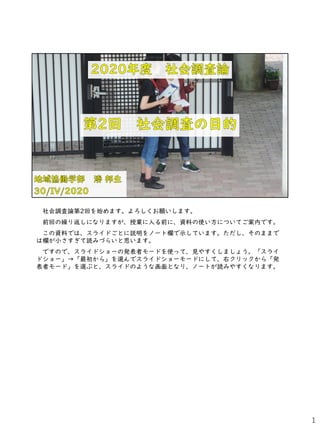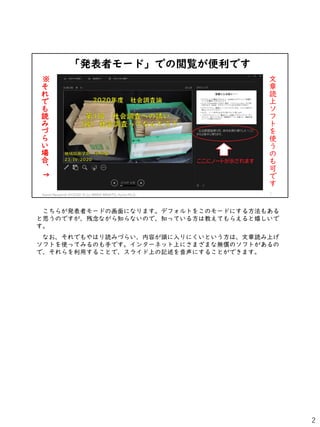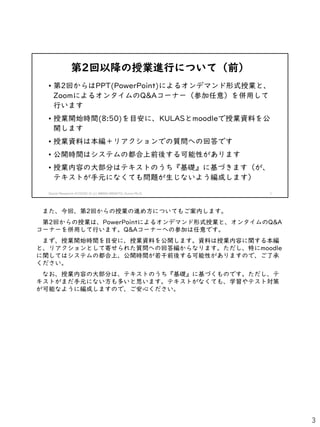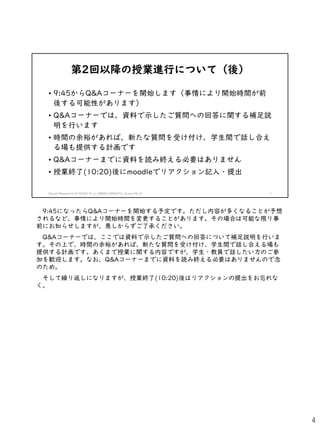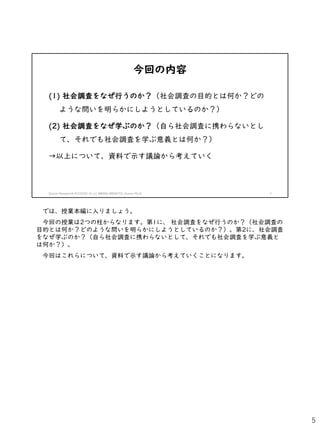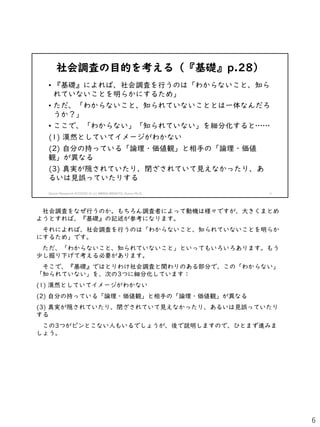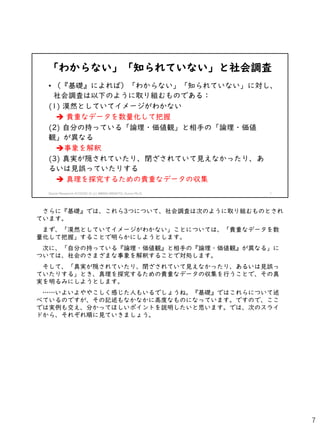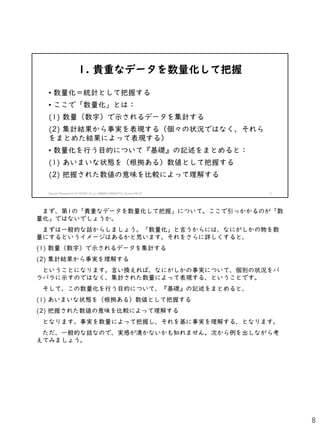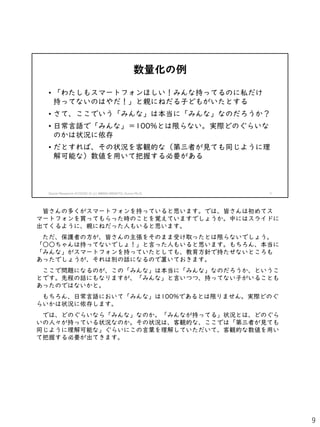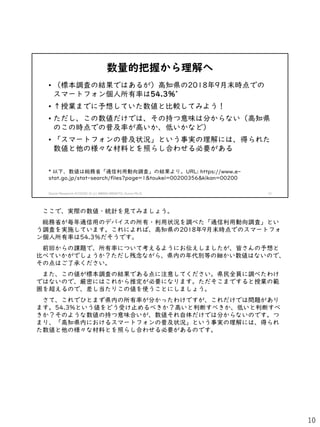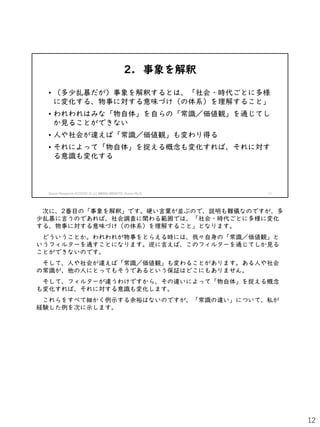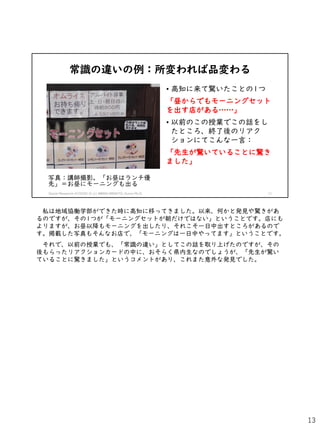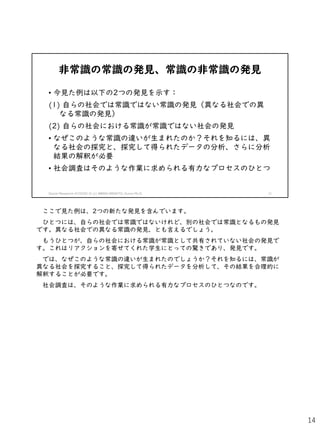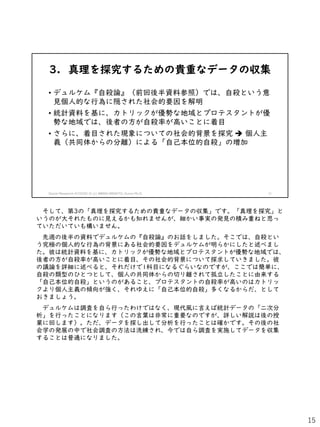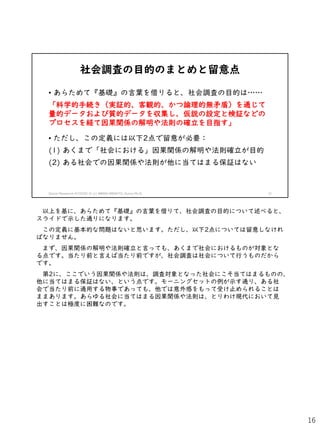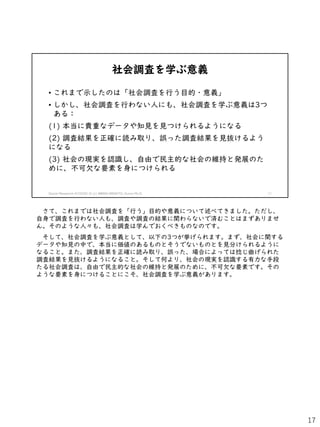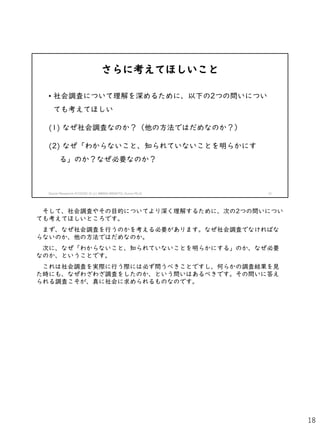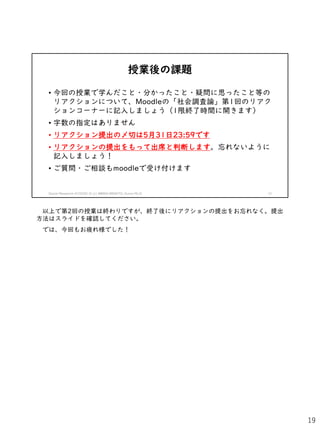(オンデマンド授业サンプル?ノート篇)社会调査论2020-2
- 2. 「発表者モード」での閲覧が便利です Social Research AY2020-II (c) MMXX MINATO, Kunio Ph.D. 2 ※ そ れ で も 読 み づ ら い 場 合 、 ↑ 文 章 読 上 ソ フ ト を 使 う の も 可 で す こちらが発表者モードの画面になります。デフォルトをこのモードにする方法もある と思うのですが、残念ながら知らないので、知っている方は教えてもらえると嬉しいで す。 なお、それでもやはり読みづらい、内容が頭に入りにくいという方は、文章読み上げ ソフトを使ってみるのも手です。インターネット上にさまざまな無償のソフトがあるの で、それらを利用することで、スライド上の記述を音声にすることができます。 2
- 3. 第2回以降の授業進行について(前) ? 第2回からはPPT(PowerPoint)によるオンデマンド形式授業と、 ZoomによるオンタイムのQ&Aコーナー(参加任意)を併用して 行います ? 授業開始時間(8:50)を目安に、KULASとmoodleで授業資料を公 開します ? 授業資料は本編+リアクションでの質問への回答です ? 公開時間はシステムの都合上前後する可能性があります ? 授業内容の大部分はテキストのうち『基礎』に基づきます(が、 テキストが手元になくても問題が生じないよう編成します) Social Research AY2020-II (c) MMXX MINATO, Kunio Ph.D. 3 また、今回、第2回からの授業の進め方についてもご案内します。 第2回からの授業は、PowerPointによるオンデマンド形式授業と、オンタイムのQ&A コーナーを併用して行います。Q&Aコーナーへの参加は任意です。 まず、授業開始時間を目安に、授業資料を公開します。資料は授業内容に関する本編 と、リアクションとして寄せられた質問への回答編からなります。ただし、特にmoodle に関してはシステムの都合上、公開時間が若干前後する可能性がありますので、ご了承 ください。 なお、授業内容の大部分は、テキストのうち『基礎』に基づくものです。ただし、テ キストがまだ手元にない方も多いと思います。テキストがなくても、学習やテスト対策 が可能なように編成しますので、ご安心ください。 3
- 4. 第2回以降の授業進行について(後) ? 9:45からQ&Aコーナーを開始します(事情により開始時間が前 後する可能性があります) ? Q&Aコーナーでは、資料で示したご質問への回答に関する補足説 明を行います ? 時間の余裕があれば、新たな質問を受け付け、学生間で話し合え る場も提供する計画です ? Q&Aコーナーまでに資料を読み終える必要はありません ? 授業終了(10:20)後にmoodleでリアクション記入?提出 Social Research AY2020-II (c) MMXX MINATO, Kunio Ph.D. 4 9:45になったらQ&Aコーナーを開始する予定です。ただし内容が多くなることが予想 されるなど、事情により開始時間を変更することがあります。その場合は可能な限り事 前にお知らせしますが、悪しからずご了承ください。 Q&Aコーナーでは、ここでは資料で示したご質問への回答について補足説明を行いま す。その上で、時間の余裕があれば、新たな質問を受け付け、学生間で話し合える場も 提供する計画です。あくまで授業に関する内容ですが、学生?教員で話したい方のご参 加を歓迎します。なお、Q&Aコーナーまでに資料を読み終える必要はありませんので念 のため。 そして繰り返しになりますが、授業終了(10:20)後はリアクションの提出をお忘れな く。 4
- 5. 今回の内容 (1) 社会調査をなぜ行うのか?(社会調査の目的とは何か?どの ような問いを明らかにしようとしているのか?) (2) 社会調査をなぜ学ぶのか?(自ら社会調査に携わらないとし て、それでも社会調査を学ぶ意義とは何か?) →以上について、資料で示す議論から考えていく Social Research AY2020-II (c) MMXX MINATO, Kunio Ph.D. 5 では、授業本編に入りましょう。 今回の授業は2つの柱からなります。第1に、 社会調査をなぜ行うのか?(社会調査の 目的とは何か?どのような問いを明らかにしようとしているのか?)。第2に、社会調査 をなぜ学ぶのか?(自ら社会調査に携わらないとして、それでも社会調査を学ぶ意義と は何か?)。 今回はこれらについて、資料で示す議論から考えていくことになります。 5
- 6. 社会調査の目的を考える(『基礎』p.28) ? 『基礎』によれば、社会調査を行うのは「わからないこと、知ら れていないことを明らかにするため」 ? ただ、「わからないこと、知られていないこととは一体なんだろ うか?」 ? ここで、「わからない」「知られていない」を細分化すると…… (1) 漠然としていてイメージがわかない (2) 自分の持っている「論理?価値観」と相手の「論理?価値 観」が異なる (3) 真実が隠されていたり、閉ざされていて見えなかったり、あ るいは見誤っていたりする Social Research AY2020-II (c) MMXX MINATO, Kunio Ph.D. 6 社会調査をなぜ行うのか。もちろん調査者によって動機は様々ですが、大きくまとめ ようとすれば、『基礎』の記述が参考になります。 それによれば、社会調査を行うのは「わからないこと、知られていないことを明らか にするため」です。 ただ、「わからないこと、知られていないこと」といってもいろいろあります。もう 少し掘り下げて考える必要があります。 そこで、『基礎』ではとりわけ社会調査と関わりのある部分で、この「わからない」 「知られていない」を、次の3つに細分化しています: (1) 漠然としていてイメージがわかない (2) 自分の持っている「論理?価値観」と相手の「論理?価値観」が異なる (3) 真実が隠されていたり、閉ざされていて見えなかったり、あるいは見誤っていたり する この3つがピンとこない人もいるでしょうが、後で説明しますので、ひとまず進みま しょう。 6
- 7. 「わからない」「知られていない」と社会調査 ? (『基礎』によれば)「わからない」「知られていない」に対し、 社会調査は以下のように取り組むものである: (1) 漠然としていてイメージがわかない ? 貴重なデータを数量化して把握 (2) 自分の持っている「論理?価値観」と相手の「論理?価値 観」が異なる ?事象を解釈 (3) 真実が隠されていたり、閉ざされていて見えなかったり、あ るいは見誤っていたりする ? 真理を探究するための貴重なデータの収集 Social Research AY2020-II (c) MMXX MINATO, Kunio Ph.D. 7 さらに『基礎』では、これら3つについて、社会調査は次のように取り組むものとされ ています。 まず、「漠然としていてイメージがわかない」ことについては、「貴重なデータを数 量化して把握」することで明らかにしようとします。 次に、「自分の持っている『論理?価値観』と相手の『論理?価値観』が異なる」に ついては、社会のさまざまな事象を解釈することで対処します。 そして、「真実が隠されていたり、閉ざされていて見えなかったり、あるいは見誤っ ていたりする」とき、真理を探究するための貴重なデータの収集を行うことで、その真 実を明るみにしようとします。 ……いよいよややこしく感じた人もいるでしょうね。『基礎』ではこれらについて述 べているのですが、その記述もなかなかに高度なものになっています。ですので、ここ では実例も交え、分かってほしいポイントを説明したいと思います。では、次のスライ ドから、それぞれ順に見ていきましょう。 7
- 8. 1. 貴重なデータを数量化して把握 ? 数量化=統計として把握する ? ここで「数量化」とは: (1) 数量(数字)で示されるデータを集計する (2) 集計結果から事実を表現する(個々の状況ではなく、それら をまとめた結果によって表現する) ? 数量化を行う目的について『基礎』の記述をまとめると: (1) あいまいな状態を(根拠ある)数値として把握する (2) 把握された数値の意味を比較によって理解する Social Research AY2020-II (c) MMXX MINATO, Kunio Ph.D. 8 まず、第1の「貴重なデータを数量化して把握」について。ここで引っかかるのが「数 量化」ではないでしょうか。 まずは一般的な話からしましょう。「数量化」と言うからには、なにがしかの物を数 量にするというイメージはあるかと思います。それをさらに詳しくすると、 (1) 数量(数字)で示されるデータを集計する (2) 集計結果から事実を理解する ということになります。言い換えれば、なにがしかの事実について、個別の状況をバ ラバラに示すのではなく、集計された数量によって表現する、ということです。 そして、この数量化を行う目的について、『基礎』の記述をまとめると、 (1) あいまいな状態を(根拠ある)数値として把握する (2) 把握された数値の意味を比較によって理解する となります。事実を数量によって把握し、それを基に事実を理解する、となります。 ただ、一般的な話なので、実感が湧かないかも知れません。次から例を出しながら考 えてみましょう。 8
- 9. 数量化の例 ? 「わたしもスマートフォンほしい!みんな持ってるのに私だけ 持ってないのはやだ!」と親にねだる子どもがいたとする ? さて、ここでいう「みんな」は本当に「みんな」なのだろうか? ? 日常言語で「みんな」=100%とは限らない。実際どのぐらいな のかは状況に依存 ? だとすれば、その状況を客観的な(第三者が見ても同じように理 解可能な)数値を用いて把握する必要がある Social Research AY2020-II (c) MMXX MINATO, Kunio Ph.D. 9 皆さんの多くがスマートフォンを持っていると思います。では、皆さんは初めてス マートフォンを買ってもらった時のことを覚えていますでしょうか。中にはスライドに 出てくるように、親にねだった人もいると思います。 ただ、保護者の方が、皆さんの主張をそのまま受け取ったとは限らないでしょう。 「○○ちゃんは持ってないでしょ!」と言った人もいると思います。もちろん、本当に 「みんな」がスマートフォンを持っていたとしても、教育方針で持たせないところも あったでしょうが、それは別の話になるので置いておきます。 ここで問題になるのが、この「みんな」は本当に「みんな」なのだろうか、というこ とです。先程の話にもなりますが、「みんな」と言いつつ、持ってない子がいることも あったのではないかと。 もちろん、日常言語において「みんな」は100%であるとは限りません。実際どのぐ らいかは状況に依存します。 では、どのぐらいなら「みんな」なのか。「みんなが持ってる」状況とは、どのぐら いの人々が持っている状況なのか。その状況は、客観的な、ここでは「第三者が見ても 同じように理解可能な」ぐらいにこの言葉を理解していただいて、客観的な数値を用い て把握する必要が出てきます。 9
- 10. 数量的把握から理解へ ? (標本調査の結果ではあるが)高知県の2018年9月末時点での スマートフォン個人所有率は54.3%* ? ↑授業までに予想していた数値と比較してみよう! ? ただし、この数値だけでは、その持つ意味は分からない(高知県 のこの時点での普及率が高いか、低いかなど) ? 「スマートフォンの普及状況」という事実の理解には、得られた 数値と他の様々な材料とを照らし合わせる必要がある * 以下、数値は総務省「通信利用動向調査」の結果より。URL: https://www.e- stat.go.jp/stat-search/files?page=1&toukei=00200356&kikan=00200 Social Research AY2020-II (c) MMXX MINATO, Kunio Ph.D. 10 ここで、実際の数値?統計を見てみましょう。 総務省が毎年通信用のデバイスの所有?利用状況を調べた「通信利用動向調査」とい う調査を実施しています。これによれば、高知県の2018年9月末時点でのスマートフォ ン個人所有率は54.3%だそうです。 前回からの課題で、所有率について考えるようにお伝えしましたが、皆さんの予想と 比べていかがでしょうか?ただし残念ながら、県内の年代別等の細かい数値はないので、 その点はご了承ください。 また、この値が標本調査の結果である点に注意してください。県民全員に調べたわけ ではないので、厳密にはこれから推定が必要になります。ただそこまですると授業の範 囲を超えるので、差し当たりこの値を使うことにしましょう。 さて、これでひとまず県内の所有率が分かったわけですが、これだけでは問題があり ます。54.3%という値をどう受け止めるべきか?高いと判断すべきか、低いと判断すべ きか?そのような数値の持つ意味合いが、数値それ自体だけでは分からないのです。つ まり、「高知県内におけるスマートフォンの普及状況」という事実の理解には、得られ た数値と他の様々な材料とを照らし合わせる必要があるのです。 10
- 11. 数量を理解する ? 54.3%は高いのか、低いのか? ? 「高い」「低い」は他との比較で言い得ること ? ここで「他」とは以下2種類: (1)「同じ時点での異なるもの(今回は都道府県)」←横断的比較 (2)「同じもの(今回は高知県)の他の時点」 ←縦断的比較 ? 実際比較すると…… ?都道府県別普及率は46位(全国64.7%、47位秋田県52.0%) ?2017年9月末は54.0%、2016年9月末は47.6% ? あらためて、54.3%は高い?低い? Social Research AY2020-II (c) MMXX MINATO, Kunio Ph.D. 11 では、54.3%という値をどう受け止めるべきか。高いのか、低いのか? ただし、この「高い」「低い」は他との比較によってはじめて言い得ることです。そ のような比較なき個人的な印象や感想は、本人以外にとっての意味を持ちません。 では、「他」をどこに求めるべきか。単純化すれば、以下の2パターンになります。 第1に、「同じ時点での異なるもの(今回は都道府県)」です。これらとの比較を「横 断的」、あるいはクロスセクションの比較と表すことがあります。 第2に、「同じもの(今回は高知県)の他の時点」です。こちらは「縦断的」、あるい は時系列、異時点間比較と言えます。 その上で、実際に比較してみましょう。まず都道府県別で見ると、高知県の普及率は なんと46位。最下位の秋田県に次ぐ低さです。 他方、時系列でみると、2017年9月末は54.0%、2016年9月末は47.6%と、徐々に 率が上がっていることが分かります。 それではあらためて、54.3%は高いでしょうか、低いでしょうか。あるいはどちらと も言えるのでしょうか。関心があればさらにデータを集めつつ、考えてみても面白そう です。 11
- 12. 2. 事象を解釈 ? (多少乱暴だが)事象を解釈するとは、「社会?時代ごとに多様 に変化する、物事に対する意味づけ(の体系)を理解すること」 ? われわれはみな「物自体」を自らの「常識/価値観」を通じてし か見ることができない ? 人や社会が違えば「常識/価値観」も変わり得る ? それによって「物自体」を捉える概念も変化すれば、それに対す る意識も変化する Social Research AY2020-II (c) MMXX MINATO, Kunio Ph.D. 12 次に、2番目の「事象を解釈」です。硬い言葉が並ぶので、説明も難儀なのですが、多 少乱暴に言うのであれば、社会調査に関わる範囲では、「社会?時代ごとに多様に変化 する、物事に対する意味づけ(の体系)を理解すること」となります。 どういうことか。われわれが物事をとらえる時には、我々自身の「常識/価値観」と いうフィルターを通すことになります。逆に言えば、このフィルターを通じてしか見る ことができないのです。 そして、人や社会が違えば「常識/価値観」も変わることがあります。ある人や社会 の常識が、他の人にとってもそうであるという保証はどこにもありません。 そして、フィルターが違うわけですから、その違いによって「物自体」を捉える概念 も変化すれば、それに対する意識も変化します。 これらをすべて細かく例示する余裕はないのですが、「常識の違い」について、私が 経験した例を次に示します。 12
- 13. 常識の違いの例:所変われば品変わる ? 高知に来て驚いたことの1つ 「昼からでもモーニングセット を出す店がある……」 ? 以前のこの授業でこの話をし たところ、終了後のリアク ションにてこんな一言: 「先生が驚いていることに驚き ました」 Social Research AY2020-II (c) MMXX MINATO, Kunio Ph.D. 13 写真:講師撮影。「お昼はランチ優 先」=お昼にモーニングも出る 私は地域協働学部ができた時に高知に移ってきました。以来、何かと発見や驚きがあ るのですが、その1つが「モーニングセットが朝だけではない」ということです。店にも よりますが、お昼以降もモーニングを出したり、それこそ一日中出すところがあるので す。掲載した写真もそんなお店で、「モーニングは一日中やってます」ということです。 それで、以前の授業でも、「常識の違い」としてこの話を取り上げたのですが、その 後もらったリアクションカードの中に、おそらく県内生なのでしょうが、「先生が驚い ていることに驚きました」というコメントがあり、これまた意外な発見でした。 13
- 14. 非常識の常識の発見、常識の非常識の発見 ? 今見た例は以下の2つの発見を示す: (1) 自らの社会では常識ではない常識の発見(異なる社会での異 なる常識の発見) (2) 自らの社会における常識が常識ではない社会の発見 ? なぜこのような常識の違いが生まれたのか?それを知るには、異 なる社会の探究と、探究して得られたデータの分析、さらに分析 結果の解釈が必要 ? 社会調査はそのような作業に求められる有力なプロセスのひとつ Social Research AY2020-II (c) MMXX MINATO, Kunio Ph.D. 14 ここで見た例は、2つの新たな発見を含んでいます。 ひとつには、自らの社会では常識ではないけれど、別の社会では常識となるもの発見 です。異なる社会での異なる常識の発見、とも言えるでしょう。 もうひとつが、自らの社会における常識が常識として共有されていない社会の発見で す。これはリアクションを寄せてくれた学生にとっての驚きであり、発見です。 では、なぜこのような常識の違いが生まれたのでしょうか?それを知るには、常識が 異なる社会を探究すること、探究して得られたデータを分析して、その結果を合理的に 解釈することが必要です。 社会調査は、そのような作業に求められる有力なプロセスのひとつなのです。 14
- 15. 3. 真理を探究するための貴重なデータの収集 ? デュルケム『自殺論』(前回後半資料参照)では、自殺という意 見個人的な行為に隠された社会的要因を解明 ? 統計資料を基に、カトリックが優勢な地域とプロテスタントが優 勢な地域では、後者の方が自殺率が高いことに着目 ? さらに、着目された現象についての社会的背景を探究 ? 個人主 義(共同体からの分離)による「自己本位的自殺」の増加 Social Research AY2020-II (c) MMXX MINATO, Kunio Ph.D. 15 そして、第3の「真理を探究するための貴重なデータの収集」です。「真理を探究」と いうのが大それたものに見えるかも知れませんが、細かい事実の発見の積み重ねと思っ ていただいていも構いません。 先週の後半の資料でデュルケムの『自殺論』のお話をしました。そこでは、自殺とい う究極の個人的な行為の背景にある社会的要因をデュルケムが明らかにしたと述べまし た。彼は統計資料を基に、カトリックが優勢な地域とプロテスタントが優勢な地域では、 後者の方が自殺率が高いことに着目、その社会的背景について探求していきました。彼 の議論を詳細に述べると、それだけで1科目になるぐらいなのですが、ここでは簡単に、 自殺の類型のひとつとして、個人の共同体からの切り離されて孤立したことに由来する 「自己本位的自殺」というのがあること、プロテスタントの自殺率が高いのはカトリッ クより個人主義の傾向が強く、それゆえに「自己本位的自殺」多くなるからだ、として おきましょう。 デュルケムは調査を自ら行ったわけではなく、現代風に言えば統計データの「二次分 析」を行ったことになります(この言葉は非常に重要なのですが、詳しい解説は後の授 業に回します)。ただ、データを探し出して分析を行ったことは確かです。その後の社 会学の発展の中で社会調査の方法は洗練され、今では自ら調査を実施してデータを収集 することは普通になりました。 15
- 16. 社会調査の目的のまとめと留意点 ? あらためて『基礎』の言葉を借りると、社会調査の目的は…… 「科学的手続き(実証的、客観的、かつ論理的無矛盾)を通じて 量的データおよび質的データを収集し、仮説の設定と検証などの プロセスを経て因果関係の解明や法則の確立を目指す」 ? ただし、この定義には以下2点で留意が必要: (1) あくまで「社会における」因果関係の解明や法則確立が目的 (2) ある社会での因果関係や法則が他に当てはまる保証はない Social Research AY2020-II (c) MMXX MINATO, Kunio Ph.D. 16 以上を基に、あらためて『基礎』の言葉を借りて、社会調査の目的について述べると、 スライドで示した通りになります。 この定義に基本的な問題はないと思います。ただし、以下2点については留意しなけれ ばなりません。 まず、因果関係の解明や法則確立と言っても、あくまで社会におけるものが対象とな る点です。当たり前と言えば当たり前ですが、社会調査は社会について行うものだから です。 第2に、ここでいう因果関係や法則は、調査対象となった社会にこそ当てはまるものの、 他に当てはまる保証はない、という点です。モーニングセットの例が示す通り、ある社 会で当たり前に通用する物事であっても、他では意外感をもって受け止められることは ままあります。あらゆる社会に当てはまる因果関係や法則は、とりわけ現代において見 出すことは極度に困難なのです。 16
- 17. 社会調査を学ぶ意義 ? これまで示したのは「社会調査を行う目的?意義」 ? しかし、社会調査を行わない人にも、社会調査を学ぶ意義は3つ ある: (1) 本当に貴重なデータや知見を見つけられるようになる (2) 調査結果を正確に読み取り、誤った調査結果を見抜けるよう になる (3) 社会の現実を認識し、自由で民主的な社会の維持と発展のた めに、不可欠な要素を身につけられる Social Research AY2020-II (c) MMXX MINATO, Kunio Ph.D. 17 さて、これまでは社会調査を「行う」目的や意義について述べてきました。ただし、 自身で調査を行わない人も、調査や調査の結果に関わらないで済むことはまずありませ ん。そのような人々も、社会調査は学んでおくべきものなのです。 そして、社会調査を学ぶ意義として、以下の3つが挙げられます。まず、社会に関する データや知見の中で、本当に価値のあるものとそうでないものとを見分けられるように なること。また、調査結果を正確に読み取り、誤った、場合によっては捻じ曲げられた 調査結果を見抜けるようになること。そして何より、社会の現実を認識する有力な手段 たる社会調査は、自由で民主的な社会の維持と発展のために、不可欠な要素です。その ような要素を身につけることにこそ、社会調査を学ぶ意義があります。 17
- 18. さらに考えてほしいこと ? 社会調査について理解を深めるために、以下の2つの問いについ ても考えてほしい (1) なぜ社会調査なのか?(他の方法ではだめなのか?) (2) なぜ「わからないこと、知られていないことを明らかにす る」のか?なぜ必要なのか? Social Research AY2020-II (c) MMXX MINATO, Kunio Ph.D. 18 そして、社会調査やその目的についてより深く理解するために、次の2つの問いについ ても考えてほしいところです。 まず、なぜ社会調査を行うのかを考える必要があります。なぜ社会調査でなければな らないのか、他の方法ではだめなのか。 次に、なぜ「わからないこと、知られていないことを明らかにする」のか、なぜ必要 なのか、ということです。 これは社会調査を実際に行う際には必ず問うべきことですし、何らかの調査結果を見 た時にも、なぜわざわざ調査をしたのか、という問いはあるべきです。その問いに答え られる調査こそが、真に社会に求められるものなのです。 18
- 19. 授業後の課題 ? 今回の授業で学んだこと?分かったこと?疑問に思ったこと等の リアクションについて、Moodleの「社会調査論」第1回のリアク ションコーナーに記入しましょう(1限終了時間に開きます) ? 字数の指定はありません ? リアクション提出の〆切は5月31日23:59です ? リアクションの提出をもって出席と判断します。忘れないように 記入しましょう! ? ご質問?ご相談もmoodleで受け付けます Social Research AY2020-II (c) MMXX MINATO, Kunio Ph.D. 19 以上で第2回の授業は終わりですが、終了後にリアクションの提出をお忘れなく。提出 方法はスライドを確認してください。 では、今回もお疲れ様でした! 19

